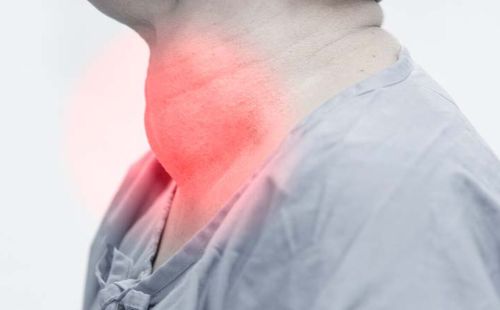It is a surgical procedure to remove the enlarged thyroid gland. The thyroid gland is located in the front part of the neck. Goiter can cause breathing or swallowing problems as a result of the enlargement of the gland. Goiter surgery is performed to relieve this pressure and relieve symptoms. It is performed under local or general anesthesia. After the procedure, you will stay in the hospital for a short time. The recovery process after surgery may take several weeks.
In Which Situations Is Goiter Surgery Performed?
 Overgrowth of the thyroid gland puts pressure on the windpipe or esophagus. It may cause breathing and swallowing problems. In this case, part or all of the thyroid gland is surgically removed. Cystic structures or nodules may form in goiter. If these structures are growing rapidly, causing aesthetic problems or carrying a risk of cancer, goiter surgery may be required. If the thyroid gland secretes too much hormone, some drug treatments are inadequate. In this case, surgery may be performed to prevent the thyroid from producing excess hormones. Surgery is required if suspicious or cancerous cells are found in the thyroid. In this way, the spread of cancer can be prevented. Some patients have aesthetic concerns when a disturbing appearance occurs in the neck area due to enlarged goiter. After goiter surgery, thyroid hormones may need to be monitored regularly. In some cases, hormone therapy may be needed.
Overgrowth of the thyroid gland puts pressure on the windpipe or esophagus. It may cause breathing and swallowing problems. In this case, part or all of the thyroid gland is surgically removed. Cystic structures or nodules may form in goiter. If these structures are growing rapidly, causing aesthetic problems or carrying a risk of cancer, goiter surgery may be required. If the thyroid gland secretes too much hormone, some drug treatments are inadequate. In this case, surgery may be performed to prevent the thyroid from producing excess hormones. Surgery is required if suspicious or cancerous cells are found in the thyroid. In this way, the spread of cancer can be prevented. Some patients have aesthetic concerns when a disturbing appearance occurs in the neck area due to enlarged goiter. After goiter surgery, thyroid hormones may need to be monitored regularly. In some cases, hormone therapy may be needed.
How is Goiter Surgery Performed?
 The surgery is performed under general anesthesia. In this way, the patient sleeps throughout the entire procedure and does not feel pain. The surgeon reaches the thyroid gland by making an incision in the lower part of the neck. The length of the incision may vary depending on the size of the goiter and whether all or part of the thyroid gland will be removed. Depending on the size of the goiter, the number or type of nodules, part (lobectomy) or all (total thyroidectomy) of the thyroid gland is removed. During this procedure, sensitive structures such as the nerves and parathyroid glands that protect the vocal cords are protected. After the thyroid gland is removed, the surgeon closes the incision area with stitches. To obtain good aesthetic results, the stitches are generally made small and thin. In some cases, a drain is placed to prevent fluid accumulation after goiter surgery. The patient is kept under observation for several hours or days. Although recovery time varies from person to person, the patient can generally return to daily life within 1-2 weeks. However, some patients may take hormone supplements after surgery. The operation is an important step in controlling the symptoms of thyroid diseases or goiter. It is usually performed successfully with low risk.
The surgery is performed under general anesthesia. In this way, the patient sleeps throughout the entire procedure and does not feel pain. The surgeon reaches the thyroid gland by making an incision in the lower part of the neck. The length of the incision may vary depending on the size of the goiter and whether all or part of the thyroid gland will be removed. Depending on the size of the goiter, the number or type of nodules, part (lobectomy) or all (total thyroidectomy) of the thyroid gland is removed. During this procedure, sensitive structures such as the nerves and parathyroid glands that protect the vocal cords are protected. After the thyroid gland is removed, the surgeon closes the incision area with stitches. To obtain good aesthetic results, the stitches are generally made small and thin. In some cases, a drain is placed to prevent fluid accumulation after goiter surgery. The patient is kept under observation for several hours or days. Although recovery time varies from person to person, the patient can generally return to daily life within 1-2 weeks. However, some patients may take hormone supplements after surgery. The operation is an important step in controlling the symptoms of thyroid diseases or goiter. It is usually performed successfully with low risk.
Things to Consider After Goiter Surgery
 Resting for the first few days after surgery helps the body recover. Staying away from strenuous activities speeds up recovery. It is important to keep the operation area clean and apply the recommended dressings. If redness, pain or swelling is noticed in the wound area, a doctor should be consulted immediately. Since there may be difficulty in swallowing, soft and liquid foods should be preferred. It is also recommended that meals not be too hot or cold. Additionally, attention should be paid to iodine balance. Mild pain is normal after goiter surgery, and the painkillers prescribed by the doctor may be soothing during this process. However, if extreme pain is felt, a doctor should be consulted. Hoarseness or change in voice may occur after surgical intervention. In this case, the voice should be allowed to heal by resting it without straining it too much. Medicines recommended by the doctor should be used regularly. Additionally, if thyroid hormone medications are required, the doses of these medications should be taken into consideration. Post-operative doctor checks should not be missed. Check-ups are important to observe the healing process. Symptoms such as fever, extreme pain, or inflammation at the wound site may be signs of infection. In this case, a doctor should be consulted without wasting time. Following these recommendations will speed up the recovery process after goiter surgery and prevent complications.
Resting for the first few days after surgery helps the body recover. Staying away from strenuous activities speeds up recovery. It is important to keep the operation area clean and apply the recommended dressings. If redness, pain or swelling is noticed in the wound area, a doctor should be consulted immediately. Since there may be difficulty in swallowing, soft and liquid foods should be preferred. It is also recommended that meals not be too hot or cold. Additionally, attention should be paid to iodine balance. Mild pain is normal after goiter surgery, and the painkillers prescribed by the doctor may be soothing during this process. However, if extreme pain is felt, a doctor should be consulted. Hoarseness or change in voice may occur after surgical intervention. In this case, the voice should be allowed to heal by resting it without straining it too much. Medicines recommended by the doctor should be used regularly. Additionally, if thyroid hormone medications are required, the doses of these medications should be taken into consideration. Post-operative doctor checks should not be missed. Check-ups are important to observe the healing process. Symptoms such as fever, extreme pain, or inflammation at the wound site may be signs of infection. In this case, a doctor should be consulted without wasting time. Following these recommendations will speed up the recovery process after goiter surgery and prevent complications.


